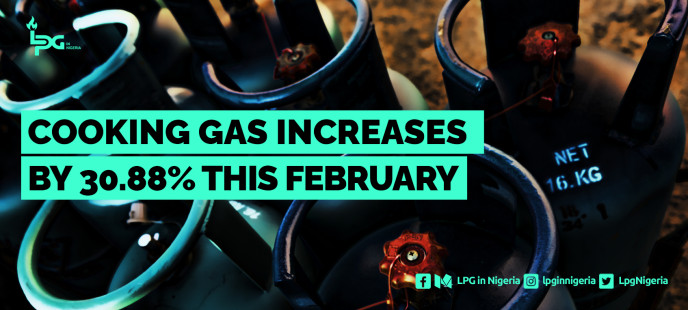- 6789
- 0
Sharing Ideas and Updates on LPG in Nigeria and related information to enable effective collaboration within the LPG Value Chain
COOKING GAS INCREASES BY 30.88% IN FEBRUARY.

To shed light on the changing prices of Cooking Gas (Cooking Gas) in different regions of Nigeria, we have compiled a thorough report on Cooking Gas prices for February 2024. This report details the costs of Cooking Gas in numerous cities nationwide, covering both the 12.5kg cylinder and per kilogram rates. Additionally, it offers a comparison with January's prices. Our findings are based on insights collected from 19 respondents, predominantly sourced from responses on Facebook and X.
States or Cities Surveyed: Akure, Ondo; Imo State; Alimosho, Lagos; Ogun State; Port Harcourt; Abia; Kwara; Warri, Delta; Lekki, Lagos; Warri, Delta; Gombe; Keffi, Nassarawa; Benue; Ibadan; Ikorodu, Lagos; Abuja; Ijede, Ikorodu; Sango Otta.
In February 2023, the price of Cooking Gas (Cooking Gas) in Nigeria varied across different cities and states. This report aims to identify the highest, intermediate, and lowest prices observed during this period and provide analysis on the implications of these price variations.
Price Observations
Highest Prices:
Imo State: ₦18,750 for a 12.5 kg cylinder, translating to ₦1,500 per kg.
Abia: ₦18,750 for a 12.5 kg cylinder, also ₦1,500 per kg.
Gombe: ₦18,750 for a 12.5 kg cylinder, again ₦1,500 per kg.
Abuja: ₦18,750 for a 12.5 kg cylinder, with the same rate of ₦1,500 per kg.
Sango Otta: ₦18,750 for a 12.5 kg cylinder, maintaining ₦1,500 per kg.
Intermediate Prices:
Ibadan: ₦17,500 for a 12.5 kg cylinder, equivalent to ₦1,400 per kg.
Ikorodu, Lagos: ₦17,500 for a 12.5 kg cylinder, also ₦1,400 per kg.
Kwara: ₦16,250 for a 12.5 kg cylinder, resulting in ₦1,300 per kg.
Port Harcourt: ₦16,250 for a 12.5 kg cylinder, likewise ₦1,300 per kg.
Warri, Delta (first entry): ₦16,250 for a 12.5 kg cylinder, again ₦1,300 per kg.
Lowest Prices:
Alimosho, Lagos: ₦15,000 for a 12.5 kg cylinder, leading to ₦1,200 per kg.
Ogun State: ₦15,000 for a 12.5 kg cylinder, also ₦1,200 per kg.
Keffi, Nassarawa: ₦15,625 for a 12.5 kg cylinder, equating to ₦1,250 per kg.
Warri, Delta (second entry): ₦15,625 for a 12.5 kg cylinder, maintaining ₦1,250 per kg.
Ijede, Ikorodu: ₦14,750 for a 12.5 kg cylinder, resulting in ₦1,180 per kg.
In January 2024, the average price of Liquified Petroleum Gas (Cooking Gas) in Nigeria stood at approximately ₦12,842. However, by February 2024, this average price surged to about ₦16,812. So, the increase in the average Cooking Gas price from January 2024 to February 2024 is ₦3,970, which represents approximately a 30.88% increase.
Analysis
Regional Disparities: The prices of Cooking Gas vary significantly across different regions of Nigeria. States like Imo, Abia, and Abuja consistently recorded the highest prices, likely due to factors such as transportation costs, local demand-supply dynamics, and distribution inefficiencies.
Urban vs. Rural Areas: Prices tend to be higher in urban areas such as Abuja and Lagos compared to rural areas like Keffi. This could be attributed to higher demand in urban centers, as well as increased operational costs for suppliers in densely populated areas.
Impact on Affordability: The high prices observed in several states may have adverse effects on the affordability of Cooking Gas for households, particularly those with lower incomes. This could potentially deter the adoption of Cooking Gas as a clean cooking fuel and lead to continued reliance on more polluting alternatives like firewood and charcoal.
Policy Implications: The government may need to review policies and interventions aimed at ensuring the affordability and accessibility of Cooking Gas across the country. This could include measures to promote domestic production, improve distribution infrastructure, and provide subsidies or incentives to reduce the burden on consumers.
Market Dynamics: The variation in prices suggests a diverse range of market dynamics at play, including local regulations, competition among suppliers, and the influence of global energy markets on import costs. Understanding these factors is crucial for policymakers to devise effective strategies for promoting sustainable Cooking Gas usage nationwide.
There is also the correlation between exchange rate and the cost of cooking gas.
In conclusion, the February 2023 data on Cooking Gas prices in Nigeria highlights the need for targeted interventions to address regional disparities and ensure the affordability and accessibility of clean cooking fuel for all segments of the population. Efforts to promote Cooking Gas usage align with broader objectives of improving public health, reducing deforestation, and mitigating climate change.
















0 Comment.